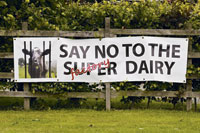One down, one to go, say Nocton protestors

Animal welfare campaigners have turned their sights on a new target after seeing off plans for a 3700-cow dairy herd in Lincolnshire.
A planning application to set up the “super dairy” at Nocton Heath, south of Lincoln, was formally withdrawn on Wednesday (16 February).
Nocton Dairies cited objections from the Environment Agency as “sole reason” for withdrawing their application for the development.
Campaigners now hope separate and unrelated plans will be withdrawn for a 2500-sow pig unit planned by Midland Pig Producers in Derbyshire. If it goes ahead, the pig unit would produce 1000 pigs a week.
The Soil Association said treating animals as “little more than factory commodities” raised serious questions about ethics and farming methods.
“This is one down, one to go,” said Emma Hockridge, the association’s head of policy.
“We hope that in light of this withdrawal of the Nocton mega-dairy application that Midland Pig Producers will not re-submit their planning application to Derbyshire County Council.”
The Soil Association was part of the alliance against Nocton and supporter of a campaign by the World Society for the Protection of Animals (WSPA).
Thousands of people signed up to the WSPA Not in my Cuppa campaign to show their distaste for milk produced on large-scale dairy farms.
The Soil Association has since launched a similar Not in my Banger campaign against the escalation of large-scale pig farming.
“If we don’t act now, thousands of pigs in the future could be kept in massive factories – changing British farming forever,” said Ms Hockridge.
WSPA director Suzi Morris acknowledged the Environment Agency’s objections were the final nail in the coffin for the Nocton plans.
But the society’s own research made it clear there were a range of reasons why Nocton should not be given the go-ahead.
“This was never just about Nocton, but about the wide range of reasons why mega-dairies are not the answer to the problems facing the British dairy industry.
“This is a victory for consumers, dairy farmers and of course the cows within it, and we can’t forget the Lincolnshire community, which has had a narrow escape.”
